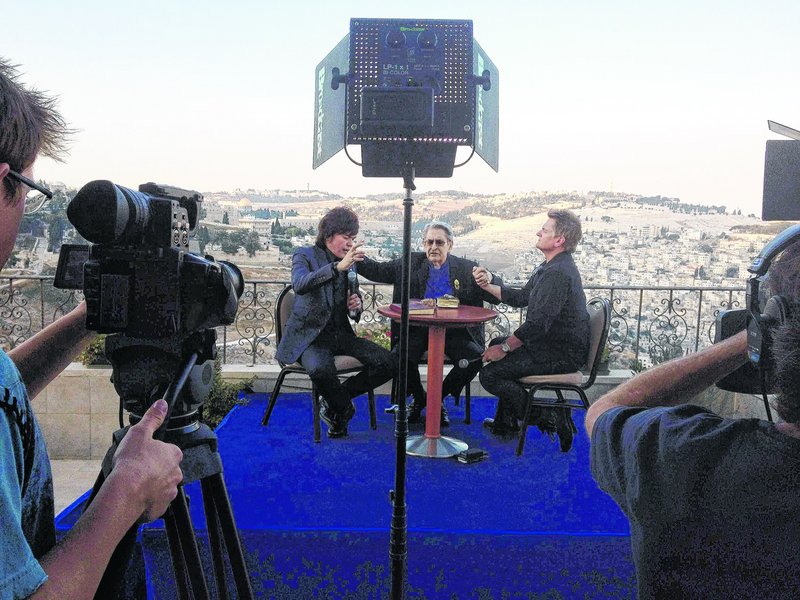JERUSALEM – If the Messiah descends from the Mount of Olives as foretold in the Bible, America’s two biggest Christian broadcasters are well-positioned to cover it live thanks to recent acquisitions of adjacent Jerusalem studios on a hill overlooking the Old City.
Texas-based Daystar Television Network already beams a 24-hour-a-day live webcam from its terrace. Not to be outdone, Costa Mesa, Calif.-based Trinity Broadcasting Network last month bought the building next door.
The dueling studios are part of an aggressive push by U.S. evangelical broadcasters seeking to gain a stronger foothold in the holy city. Their presence not only offers boasting rights with American viewers and contributors, but also a platform for spreading the gospel of Jesus Christ to Jews in Israel.
In addition to its new multistory building, TBN is negotiating with Israel’s Yes satellite television provider to secure a full-time home for its evangelical Shalom TV channel.
Daystar already airs its English-language programming in Israel with dedicated channels on both Yes and cable provider HOT Telecommunications Systems, claiming to be the first Christian evangelical broadcaster to transmit a gospel message to Israeli television sets 24 hours a day.
“The main thing we want to do is help sponsor what we call Messianic Jews, or Jews that have received Jesus Christ as their Messiah,” said TBN co-founder Paul Crouch, who recently wrapped up a tour of Israel with 1,800 TBN supporters, most of them from America. “We want to do some Hebrew language programs to reach out to Jews and entice them to read the word of God and become what we call a completed Jew.”
Such proselytizing angers Orthodox Jewish groups who say it threatens the character of the Jewish state. Christian proselytizing is legal in Israel, although the government has at times restricted and discouraged the practice; members of the Jewish faith do not seek to convert those of other faiths.
“One of the things I find offensive is that they are bragging about their missionary work,” said Ellen Horowitz, research director at Jewish Israel, a grass-roots group created in 2008 to track and counteract Christian missionaries in Israel. “They’re actually very in-your-face about it.”
Horowitz said proselytizing is a touchy subject in Israel. “Our people have been through the wringer already with either persecution or assimilation,” she said. “Now people finally get to a Jewish nation and someone pushes a copy of the New Testament in Hebrew at them. A sensitive line is being crossed.”
When Daystar debuted in Israel in 2006, it created such a public uproar that the channel was temporarily suspended from the HOT network. It was restored after a court challenge.
Since then, Christian evangelical groups have quietly and steadily expanded their footprint in Jerusalem.
Last spring, evangelist organizer Mike Evans began soliciting donations from U.S. supporters for his $10 million purchase of a building in Jerusalem’s city center, where he plans to open a facility devoted to Christian evangelism.
In July, American missionary Rick Ridings, a nephew of Crouch who operates a walk-in prayer center near Mt. Zion, hosted several hundred Israeli youths at a gospel music and prayer festival in Tel Aviv.
Crouch said TBN is striving to promote Christianity in Israel, where the faith is sometimes overshadowed by the struggle between Judaism and Islam. Trinity Broadcasting already is one of the world’s largest religious broadcasters, with 18 networks in seven languages.
“Christianity is not represented in Israel as well as it could,” he said. “We hope to equalize that and give Christianity a better platform.”
The latest inroads by evangelical Christians have not triggered the backlash that occurred in 2006 when Daystar went on the air. In fact, Crouch said TBN’s biggest obstacle in Jerusalem so far is rival Daystar, which he said tried to block TBN’s Shalom Channel from airing on the Yes satellite.
“They raised a stink,” Crouch said. “I guess some of our Christian brothers don’t want the competition.”
Some Israelis are welcoming members of the American evangelical community as strategic partners, both politically and economically.
In addition to becoming the fastest-growing segment of Israel’s tourism market, U.S. evangelicals tend to be staunchly pro-Israel, lobbying in Washington on the Israeli government’s behalf on matters such as the Palestinian conflict or West Bank settlement construction.
Send questions/comments to the editors.



Success. Please wait for the page to reload. If the page does not reload within 5 seconds, please refresh the page.
Enter your email and password to access comments.
Hi, to comment on stories you must . This profile is in addition to your subscription and website login.
Already have a commenting profile? .
Invalid username/password.
Please check your email to confirm and complete your registration.
Only subscribers are eligible to post comments. Please subscribe or login first for digital access. Here’s why.
Use the form below to reset your password. When you've submitted your account email, we will send an email with a reset code.